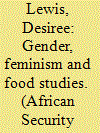| Srl | Item |
| 1 |
ID:
142056


|
|
|
|
|
| Summary/Abstract |
Policy research and scholarship on food has rapidly increased in recent decades. The attention to ‘gender' within this work appears to signal important practical and academic efforts to mainstream gendered understandings of food consumption, distribution and production into expansive conceptualisations of human security. This article argues that the gender-related work on food has wide-ranging and often troubling political and theoretical foundations and implications. Often growing out of knowledge regimes for managing social crises and advancing neo-liberal solutions, much gender and food security work provides limited interventions into mainstream gender-blind work on the nexus of power struggles, food resources and globalisation. A careful analysis of knowledge production about gender and food is therefore crucial to understanding how and why feminist food studies often transcends and challenges dominant forms of scholarship and research on food security. This article's critical assessment of what food security studies in South Africa has entailed at the regional level and in global terms also focuses on the methodological and theoretical feminist interventions that can stimulate rigorous conceptual, research and practical attention to what has come to be understood as food sovereignty.
|
|
|
|
|
|
|
|
|
|
|
|
|
|
|
|
| 2 |
ID:
178248


|
|
|
|
|
| Summary/Abstract |
Leading feminist scholars and activists have critiqued the current impact of South Africa’s provisions for gender equality and sexual rights. The country boasts one of the most progressive constitutions in the world, and its formal mechanisms for gender transformation and sexual citizenship are – at a global level – pathbreaking. At the same time, however, violence against women, gender non-conforming people and gays and lesbians or ongoing gender-based injustices in workplaces, educational institutions and many homes testify to the fact that such measures have not transformed ideological beliefs, institutional cultures and power relations in many public and domestic contexts. This article confronts the disjuncture between the formal provision of rights and actual practice, by analysing the effects of provisions devoid of transformative impact. It is argued that the country’s seemingly democratic arrangements for gender justice and sexual citizenship reproduce new forms of governmentality, biopolitics and biopower. By drawing on the work of Jasbir Puar, the article argues that South Africa’s imagining as a democratic state is based largely on its provision of rights around sexuality and gender, and in relation to peripheries that are ‘measured’ by the absence of these. In the global imagining, gender equality and sexual citizenship currently serve as tropes for definitive freedoms and democracy. The recognition of gender equality and sexual citizenship ratifies a particular international understanding of ‘democracy’, one that is congruent with global neoliberal standards, and that actively reproduces the gendered, heteronormative, classist and racist status quo.
|
|
|
|
|
|
|
|
|
|
|
|
|
|
|
|